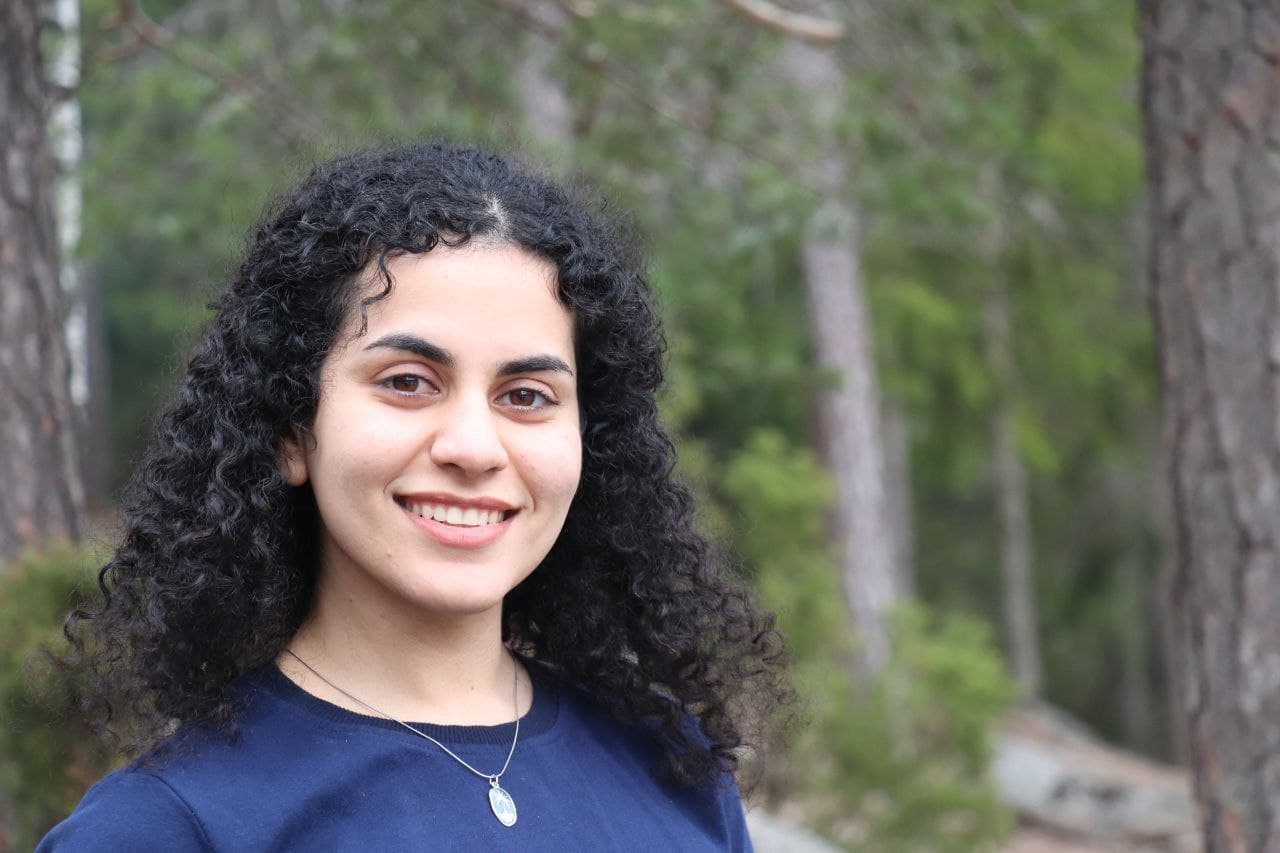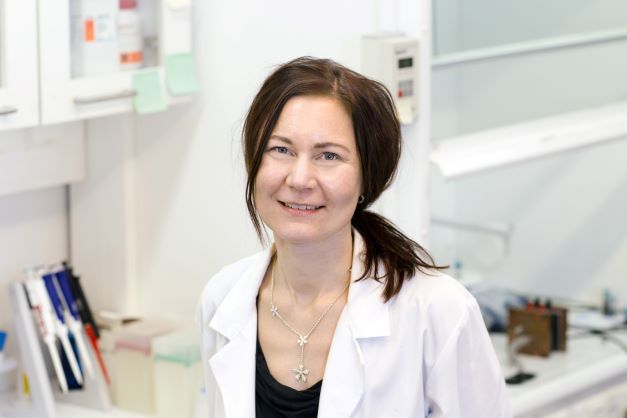Tanja Kallio: Boosting the hydrogen revolution
Researchers are working to develop an electrocatalyst that does not require noble metals

Electrochemical energy storage can be one solution to the increasing of the need for electrochemical energy conversion and storage devices .Thus, the Electrochemical Energy Conversion research group investigates and develops materials and devices for these applications. Our aim is to understand functioning of these to improve the existing ones and to develop alternative solutions.
Our research is focused on investigating polymer electrolyte fuel cells (PEFC) and electrolysers as well as lithium ion batteries and supercapacitors and covers synthesis, characterization and integration of new materials. Alongside functionality of the materials and devices, we are interested in their durability and degradation mechanisms as well as optimization of above mentioned technologies for their applications.
Responsible (or sustainable) energy conversion and storage is one of the key issues for large-scale utilization of intermittent renewable energy sources. We want to foster and contribute this energy transition by developing those critical technologies:
One promising approach to combat climate pollution is using carbon dioxide as a raw material in chemical industry processes. For instance, CO₂ can be captured and converted into valuable products through electrochemical CO₂ reduction (eCO₂R). A key challenge of this method is the undesired transfer of species from one electrode to the other through the polymer electrolyte membrane (PEM), known as crossover.
The Improving the Performance of CO₂ Electrolyzer by Modifying Anion-Exchange Membranes via Polyelectrolyte Deposition (IPEC) joint project between Aalto University and Liquidsun company focuses on investigating the effects of layer-by-layer (LbL) polyelectrolyte coatings on PEMs. The goal is to enhance the performance of eCO₂R systems by reducing crossover, thereby facilitating the commercialization of this technology. Successful improvement of CO₂ conversion efficiency could yield significant environmental benefits.
The IPEC project is funded by the Finnish Research Impact Foundation (FRIF) under the Tandem Industry Academia (TIA) Postdoc program.
The Sea4Volt project brings together academia and industry to develop low-cost anion exchange membrane (AEM) electrolyser technology that can operate directly on seawater under a slight pH gradient to produce green hydrogen. The project addresses key challenges related to catalyst degradation, membrane durability, ionic conductivity, and operational stability.
Within the EECS group, we integrate atomic layer deposition (ALD) to design core-shell electrocatalysts that protect the cathode from cation precipitates, contaminants, and degradation, thereby improving the hydrogen evolution reaction (HER) performance. The thin metal oxide (MOx) shell is expected to act as a semipermeable barrier, allowing the selective transfer of reactants and products while improving durability and stability. Catalyst activity, stability, and degradation behavior will be evaluated under seawater conditions, followed by post-mortem analysis.
Sea4Volt is a Horizon Europe project co-funded by the European Union and the Clean Hydrogen Partnership.
The Unite!Energy EU project connects the Unite! Alliance universe to educate experts for clean hydrogen technologies together with our stakeholders. The doctoral student projects cover the whole value chain form catalysing clean hydrogen generation and utilization to large scale systems and feasibility analysis. The EEC group doctoral student carries out KTH Aalto double degree and investigates novel electrocatalysts for hydrogen oxidation alkaline membrane fuel cells (AEMFC) in close collaboration with Powercell Sweden AB.
Hydrogen plays an important role in decreasing carbon emission in industry, transport, and the energy sector. With the ambitious goals set in place by EU and other countries to achieve carbon neutrality, the need and demand for clean hydrogen has immensely surged. This creates a higher requirement for institutions that specialize in advancing electrolyzer technologies. SafeH₂ focuses on understanding safe hydrogen generation and handling and developing sustainable electrolyzer technologies to balance the demand and reliability in the hydrogen economy.
The Aalto University EEC team will contribute by analyzing degradation processes in emerging anion exchange membrane electrolyzers and investigating them under realistic conditions. Our objectives include developing customized cathode electrocatalysts that are less sensitive to impurities and utilize metals more efficiently, thereby increasing both the efficiency and lifespan of the catalyst.
By combining experimental and modeling studies, SafeH₂ will establish critical knowledge on hydrogen safety, optimal operating strategies, and material durability - supporting Finland’s hydrogen industry in achieving sustainable growth.
The InnoLine project is a collaborative research initiative between Aalto University and Pulsedeon company, bridging academia and industry to advance solid-state lithium metal batteries (SSLMBs). The project addresses key challenges associated with lithium metal electrodes, including dendrite growth, high volume expansion, and interface instability, by using thin-film deposition technologies such as pulsed laser deposition and atomic layer deposition (ALD).
By integrating ALD and thin-film techniques, the project aims to enhance electrolyte stability, suppress dendrite formation, and improve the long-term cycling performance of SSLMBs, paving the way for safer and more efficient next-generation batteries.
The problem: Sustainable manufacturing of Gen. 4b solid-state batteries (SSBs) with a minimized amount of critical raw materials (Co and Li), and with superior performance and safety is a major challenge in today’s battery research. Lithium-ion battery (LiB) cells with conventional active materials are reaching their limits in terms of energy densities. Also, safety issues arise with the utilization of liquid organic electrolytes which is becoming even more critical with the introduction of advanced materials to increase cell voltage and fast charging rates. Hence, there is an urgent need for the development of innovative scalable manufacturing technologies based on new solid-state electrolytes (SSEs) that can also be combined with metallic lithium at the anode, leading to significantly enhanced energy density.
The SOLiD project aims to create a sustainable and cost-efficient pilot scale manufacturing process for a high energy density, safe and easily recyclable solid-state Li-metal battery (LMB).
The BATCircle ecosystem consists of key Finnish research and industrial actors involved in the battery metals sector with a total budget of 22 M€. The ecosystem has been formed under Business Finland's “Batteries from Finland” program. The cooperation effort is expected to lead to the formation of a domestic battery metals ecosystem that follows the principles of circular economy. One of the important topics of this ecosystem is research on preparation and performance of “precursors and active materials” which are used in the production of electrode materials of lithium ion batteries. This research is conducted by Aalto University, University of Oulu, University of Eastern Finland and GTK Geological Survey of Finland.
New electrocatalysts enabling storing of electrical energy into chemical compounds, e.g. hydrogen, and regeneration of electricity are designed, synthesized and investigated in a rational manner. The aim was to design and develop new low cost electrocatalysts for readily scalable and integrable hydrogen energy conversion technology. These materials are free of PGMs categorized as critical raw materials by EU. Catalyst material optimization (rational design) was realized in close collaboration between groups specialized in modelling, materials synthesis and electrocatalysis.
The DEMEC project was funded by Academy of Finland New Energy Programme.
New readily recyclable nanostructured catalysts comprising of abundant raw materials are developed and assessed. These materials have potential to replace critical platinum group metals (PGM) based catalysts in several existing and emerging processes including synthesis used in chemical industry and biofuel synthesis and energy conversion. To achieve this we used modelling to gain fundamental understanding of the limiting steps of the investigated reactions on the novel nanostructured materials synthetized using unique methods developed by us. The modelling results were interlinked with investigation of structure and catalytic activity of these materials to give guidelines for the further research. A rather broad selection of reactions was investigated because of the importance of this field.
The SUPER project was funded by Academy of Finland MISU programme.
The ever-expanding demand for renewable energy spotlights electrochemical prowess. Feasible technologies for generating and storing green power have already entered the market. However, they rely heavily on critical raw materials such as cobalt in batteries and scarce platinum-group metals (PGM) in electrochemical converters, which inhibits large-scale deployment in the long term.
This project unites several global contributors in the field, sharing the same target: developing PGM-free and ultra-low-platinum MEAs that will comprise the hearts of electrolysers and fuel cells. (While the former device is designed to store intermittent solar and wind energy in hydrogen gas, the latter will release the energy by oxidizing the gas whenever needed.) Aalto contributes strongly to both the synthesis and the characterization of the desired electrocatalysts for the pertinent electrochemical reactions.
The aim of the project is to train young researchers in all scientific and technological aspects of the storage of renewable electricity into fuels and chemicals. The scientific aim is to develop and upscale novel catalysts meeting specific activity and selectivity targets for oxygen evolution and CO2 reduction. The involvement of two industrial partners ensures rapid application of the fundamental science in electrochemical technology.
Funded by Business Finland, the Next Generation Battery Materials and Concepts project will develop materials and their processing technologies for solid-state lithium batteries (SSLB). The project combines the expertise of multiple Finnish research organizations and private companies.
Electrochemical reduction of CO2 is one possible route to mitigate climate change since it uses the abundant greenhouse gas CO2 as starting material to produce important fuels and chemicals. However, there remains much work to find selective, highly active and robust catalyst materials for larger scale electrochemical CO2 reduction.
In USVA, we aim to develop electrocatalyst materials by using simple synthesis methods, earth-abundant elements and other cheap raw-materials to reduce CO2 into value added chemicals such as formic acid. The focus of the project is to design, synthesize and thoroughly characterize novel electrocatalysts which would express high selectivity and activity towards electrochemical reduction of CO2. We also aim to reveal mechanistic insights into the effects that govern the selectivity and activity of our electrocatalyst materials to further increase our understanding of electrochemical CO2 reduction and to enable rational design of new catalysts.
The project is funded by Jane and Aatos Erkko Foundation.
The scientific goal of the HydrogenLung action is to accelerate mass diffusion for Hydrogen oxidation reaction (HOR: H2 →2H+) by modifying superhydrophilic Pt@N-WC nanoarray electrode with lung-like multistage aerophilic gas channels (MAGC). As the gas diffusion step determines the rate of most HOR, the specific structure will accelerate the reaction with great promise. By developing new wettability structure and verifying its effect on HOR, we will offer a method to accelerate mass transfer for all gas-consuming triphase catalysis. This scientific action involves both fundamental research of HOR and applied research of hydrogen fuel cell. It is an interdisciplinary study between chemistry (electrochemistry) and physics (surface physics).
Electricity generation based on renewables is unpredictable, but hydrogen (H2) could be a promising energy storage route. Since over 95% of H2 comes from breaking the carbon-hydrogen bond in hydrocarbons, storing hydrogen bound to carbon may provide a long-term solution. However, extracting hydrogen from liquid hydrocarbons includes CO2 emissions. To address this problem, the EU-funded LESGO project aims to store energy in the C-H bond of reduced graphene oxide (rGO-H). The advantages of rGO-H include safe storage, easy transportation, an energy density over 100 times larger than that of H2 gas and no CO2 emissions in the electricity generation process. The project will promote an affordable and eco-friendly means of supplying electrical power on demand where required.
The HiQ-CARB funding project aims to provide new carbons with superior performance and a low carbon footprint for lithium-ion batteries in Europe. Carbon is needed in batteries to improve the electronic conductivity of the cathodes and helps achieve fast charge and discharge rates. In HiQ-CARB, the carbon black is replaced by a new and more environmentally friendly acetylene black. For the project, high-purity conductive additives and high-quality carbon nanotubes are being developed and produced by the leading European material producers. The developed high quality carbon additives and carbon nanotubes will be used for the production of the high energy and high-performance cathodes. CUSTOMCELLS® will use the developed carbon additives to scale up electrode manufacturing and produce pilot cells with high power density and high energy density.
The project team of HiQ-CARB includes companies Arkema (France), Custom Cells (Germany) and Orion Engineered Carbons (Germany). Fraunhofer Institute for Silicate Research ISC, Aalto University and the University of Bordeaux are involved in the scientific part of evaluation and testing of the new material combinations and the battery cells made from them. The HiQ-CARB project receives EU funding from EIT Raw Materials to scale up and validate these important battery materials.
Hydrogen business is increasing rapidly at the EU level and globally, and Finnish companies are figuring out their roles in this market. These companies need to build new competencies to develop their product and service portfolio to enter the global market with competitive and value-creating offerings. FinH2 will support the target by providing critical up-to-date knowledge and hands-on experience from the whole hydrogen value chain, from materials and components to system integration and hydrogen utilization. The export potential for Finland in electrolyzer technology is significant and estimated to be 3 B€ annually in 2030.
To answer the urgent need for carbon-free energy, disruptive options should be considered. The loading of deuterium into palladium-based materials under certain conditions, could result in the production of excess heat, leading to a breakthrough zero-emissions energy generation. The HERMES gathers the expertise from six multidisciplinary European laboratories, focusing on the fundamentals of the palladium-hydrogen system, the synthesis of new, well-controlled, palladium-based materials, and the calorimetric study of the deuterium loading into palladium using Seebeck calorimeters.
The contribution from Aalto University aims at
The project is funded by the European Union’s Horizon 2020 research and innovation programme.

My professorship is Physical Chemistry and Electrochemistry and my research focuses on electrochemical energy conversion materials and devices. For widespread adoption of renewable, intermittent energy technologies, various efficient and sustainable electrochemical energy conversion and storage alternatives are needed.
In my group, we contribute to this effort by investigating and developing in particularly electrocatalysts and electrode materials for such applications as polymer electrolyte fuel cells and electrolyzers, lithium ion batteries and supercapacitors.
The core theme is reduction of the utilization of non-earth-abundant-elements without sacrificing the electrochemical device performance. As an alternative approach, strategies to increase the lifetime of the critical active materials is studied.
To achieve our goals, we aim to understand structure – activity – durability interrelations of the active energy conversion materials. Hence, our work covers material synthesis, material structural and electrochemical characterization and integration in laboratory-scale devices. This includes also post-mortem analysis of the active materials to investigate degradation mechanism. To obtain fundamental understanding on complex phenomena, we carry out these investigations in close collaboration with groups specialized in modelling and advanced structural characterization technologies.








Researchers are working to develop an electrocatalyst that does not require noble metals

From research into electro-chemical conversion to creating policy for demand-response planning, Aalto University is working on ways to develop smarter and more sustainable energy grids

International projects aim to develop new more environmentally friendly materials and production methods for rechargeable lithium batteries

Our professor Tanja Kallio was interviewed as an expert in HS Vision.

New recycling method replenishes lithium in electrodes while keeping existing structure intact – and performance is nearly as good as new ones

A study aiming to use CO2 as, for example, transport fuel have received significant funding from the Jane and Aatos Erkko Foundation.

Seed funding is a stepping stone to cooperation with other research groups, and a great channel to test your ideas.

Mitigation of climate change requires increasing the use of renewable energy and the development of storage.

How to make the storing of renewable energy cheaper and easier? If this study is successful, it will represent a major leap towards finding a solution to climate change.
Researchers succeeded in manufacturing electrocatalysts with one hundredth of the amount of platinum that is usually needed.
Researchers succeeded in creating an electrocatalyst that is needed for storing electric energy made of carbon and iron.
Aalto University’s share of the funding is about half a million euros.

Professor Tanja Kallio develops ecological, safe and affordable materials for batteries and electrocatalysts.
M.Sc. (Tech.) Eldar Khabushev will defend the doctoral thesis "Fine-Tuning of Single-Walled Carbon Nanotube Properties for Transparent Conductive Applications" on 13 January 2023 at 13 in Aalto University School of Chemical Engineering.

Welcome to Workshop on Catalytic Reactions with Ion Transfer through Interfaces (ITICAT2019), organized in August 15 - 17, 2019, as a pre-conference of EuropaCat2019.

Title of the thesis: Stabilized Nickel Rich Layered Oxide Electrodes for High Performance Lithium-Ion Batteries

Title of the thesis: Sn- ja Bi-pohjaisten elektrokatalyyttien ja elektrodien suunnittelu tehokkaan hiilidioksidin muodostusta varten

Electrochemical Reduction of CO₂ on Molecular Catalyst: Unfolding Operation Parameters Influence on Product Selectivity (title of the thesis)
